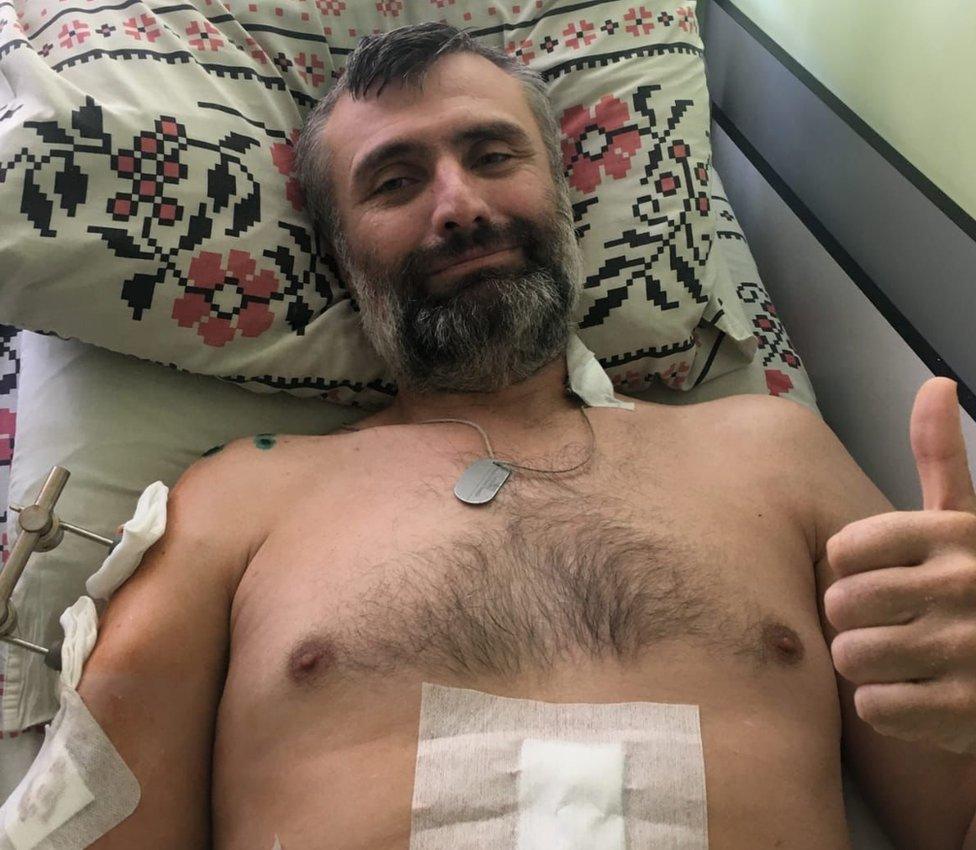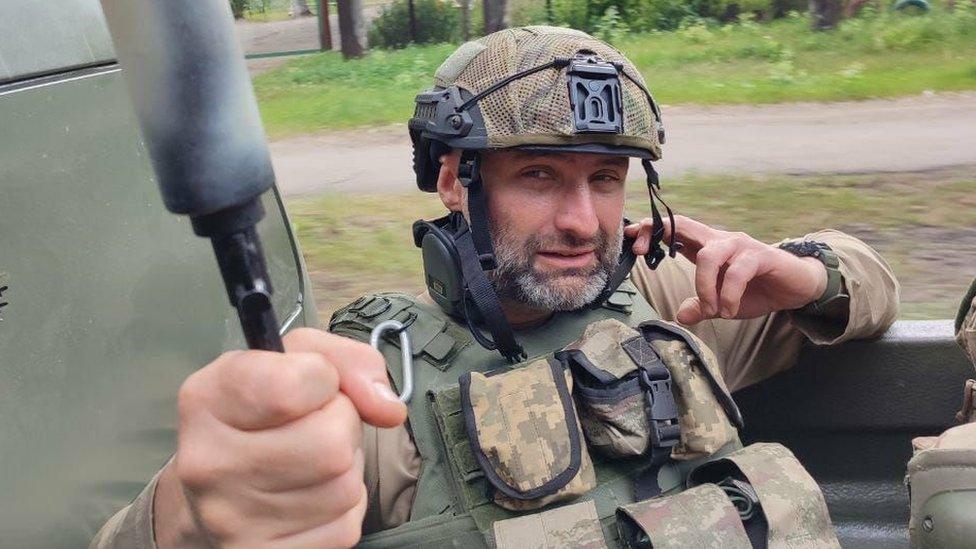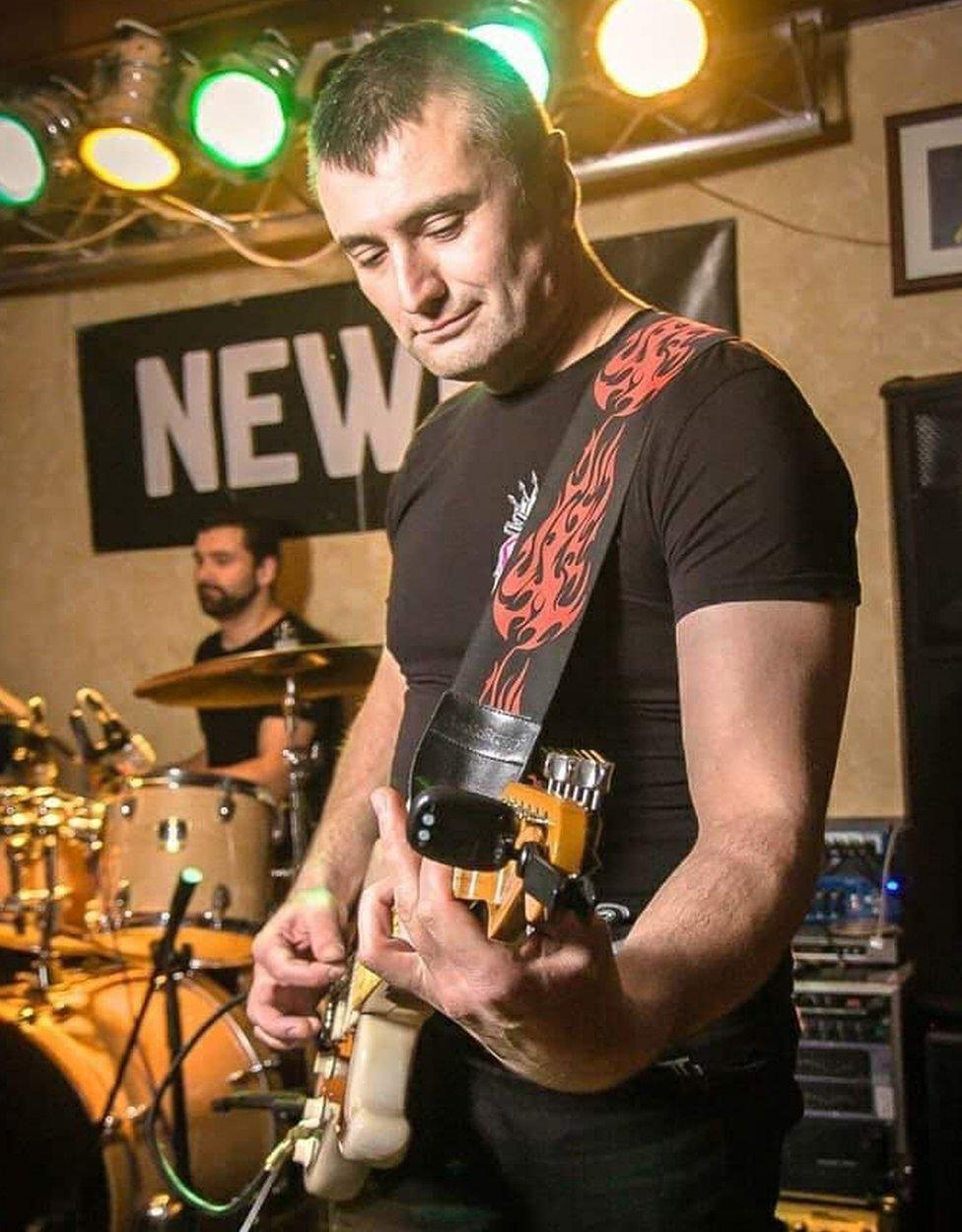The wounded Ukraine soldier being treated in Scotland
- Published
Artem says he 'came close to death' while fighting for Ukraine.
Artem is the only Ukrainian soldier being treated for injuries by a Scottish hospital.
The 41-year-old father-of-five never expected to be a soldier.
Before the Russian invasion a year ago he was a professional musician, playing in a successful band and studying classical singing at the national conservatoire.
When the war started, his wife and four of his children fled Kyiv and came to Scotland as part of the Homes for Ukraine scheme.
Artem and his eldest son decided to stay and fight.
He says: "It was very hard. I am a family man, I love my wife and children so much, and the uncertainty of how long we'd be apart was such a heavy burden for me.
"But what can you do? That's just how it is. I had to defend my homeland."
In August last year he was at an observation point in the eastern Ukraine town of Zaitseve when a mortar shell landed near him.
"I felt a flash, I didn't hear anything - no explosions - just darkness, dust, no pain, just heat near my groin because of the hot shell debris," he says.
Artem suspected his leg and hand were affected, but at first he was not sure.
The medical staff reacted quickly, applying tourniquets to stem the bleeding.
"That's when the hell-like pain started," he says.
"Those who did not experience this cannot imagine what it is like to have your injured joints pulled tight and set in place. The pain was horrible."

Artem was injured by a mortar shell in eastern Ukraine
Artem wondered if he would die, but says the pain meant he felt that he had some chance of survival.
He was told that more than 100 pieces of shrapnel had lodged in his body.
Scars and pockmarks are still visible all over his arm, months later, as he continues his rehabilitation in Glasgow with his family.
He came to Scotland in late December after first receiving emergency care in a military hospital near Kyiv.
Artem says he had heard of injured companions seeking treatment abroad, but none had gone to Scotland.
His move took months to arrange and his wife had to get an invitation letter for NHS treatment at Glasgow's Queen Elizabeth University Hospital.
He has been receiving regular out-patient appointments to monitor nerve damage in his hand and to restore mobility through physiotherapy.

Artem never expected to be in the army
Artem says it is perplexing that he is the only Ukrainian soldier in Scotland.
Other countries, such as Poland and the Baltic nations, have formal arrangements where wounded Ukrainian soldiers can receive medical treatment and be with their families.
Artem had to make his own arrangements and would like to see it made easier for others to do the same.
"Scotland has very high quality medicine, enough hospitals and infrastructure to offer help to a greater number of injured fighters," he says.
"In my time I was surprised to discover that I am the first soldier who had undergone treatment in Scotland.
"If my family hadn't been here already, I wouldn't have ended up here."
Artem says he is glad to be reunited with his family, who have settled well in Scotland.
"My family is very happy here, the kids go to school, the youngest goes to nursery, my wife attends a college where she is improving her English skills," he says.
"You have a wonderful country, with a very interesting and heroic history.
"Your weather is similar to ours but there's too much dampness. Rain, rain, rain."
Before the invasion, Artem's life was dominated by music and he had never expected to have to fight for his country.

Before the invasion Artem was a successful musician

After initially defending Kyiv, he was mobilised into the Ukrainian army in April and sent to the east of the country.
"From the very first day, we entered a kind of hell," he says.
He found the relentless artillery fire overwhelming.
"One of our companions was counting that in the space of one hour, more than 400 shells were being launched in our direction," he says.
Among the places he fought were towns near Bakhmut, which has been the site of some of the most fierce battles of the war.
"My greatest victory is that I, and my companions, did not give in to the feeling of fear, we did not abandon our positions, we did not run or retreat, but we stood and carried out the orders that were given to us," he says.
Artem says the war has, understandably, hardened him and brought him to hate the enemy. But it has also made him value life so much more.
He says: "I started to treasure life itself, the fact that I am alive, and many of my comrades aren't."
Artem is in regular touch with his senior officers, keeping them up-to-date on his recovery.
With the first anniversary approaching, the war shows no sign of ending soon but Artem does feel hope for Ukraine's future - as long as Western support continues.
And does he think he will go back to fight?
"It's my duty to do so," he says.
Interpreting and translation by Olena Nechyporuk